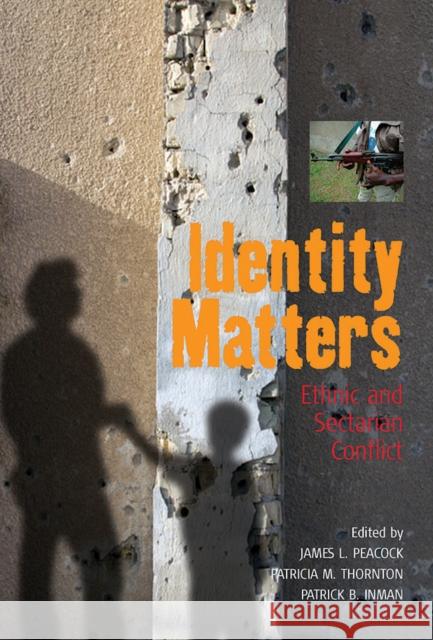Identity Matters: Ethnic and Sectarian Conflict » książka
Identity Matters: Ethnic and Sectarian Conflict
ISBN-13: 9781845453084 / Angielski / Twarda / 2007 / 258 str.
Identity Matters: Ethnic and Sectarian Conflict
ISBN-13: 9781845453084 / Angielski / Twarda / 2007 / 258 str.
(netto: 484,12 VAT: 5%)
Najniższa cena z 30 dni: 498,70
ok. 30 dni roboczych.
Darmowa dostawa!
In response to the attacks of September 11, 2001 and war in Afghanistan, the Fulbright New Century Scholars program brought together social scientists from around the world to study sectarian, ethnic, and cultural conflict within and across national borders. As one result of their year of intense discussion, this book examines the roots of collective violence - and the measures taken to avoid it - in Burma (Myanmar), China, Germany, Pakistan, Senegal, Singapore, Thailand, Tibet, Ukraine, Southeast Asia, and Western Europe. Case studies and theoretical essays introduce the basic principles necessary to identify and explain the symbols and practices each unique human group holds sacred or inalienable. The authors apply the methods of political science, social psychology, anthropology, journalism, and educational research. They build on the insights of Gordon Allport, Charles Taylor, and Max Weber to describe and analyze the patterns of behavior that social groups worldwide use to maintain their identities. Written to inform the general reader and communicate across disciplinary boundaries, this important and timely volume demonstrates ways of understanding, predicting and coping with ethnic and sectarian violence. James L. Peacock is Kenan Professor of Anthropology and Professor of Comparative Literature at the University of North Carolina at Chapel Hill, a member of the American Academy of Arts and Sciences, and the 2002 recipient of the American Anthropological Association's Boas Award. His publications include: Grounded Globalism (University of Georgia Press, 2007), Pilgrims of Paradox (Smithsonian Institution Press, 1989), The Anthropological Lens (Cambridge University Press, 1986, 2001), and Rites of Modernization (University of Chicago Press, 1968, 1987). Patricia M. Thornton is Associate Professor of Political Science at Trinity College in Hartford, Connecticut and the author of Disciplining the State: Virtue, Violence, and State-Making in Modern China (Harvard University Press, 2007). Patrick B. Inman is a freelance academic editor and independent historian.
In response to the attacks of September 11, 2001 and war in Afghanistan, the Fulbright New Century Scholars program brought together social scientists from around the world to study sectarian, ethnic, and cultural conflict within and across national borders. As one result of their year of intense discussion, this book examines the roots of collective violence - and the measures taken to avoid it - in Burma (Myanmar), China, Germany, Pakistan, Senegal, Singapore, Thailand, Tibet, Ukraine, Southeast Asia, and Western Europe.
Case studies and theoretical essays introduce the basic principles necessary to identify and explain the symbols and practices each unique human group holds sacred or inalienable. The authors apply the methods of political science, social psychology, anthropology, journalism, and educational research. They build on the insights of Gordon Allport, Charles Taylor, and Max Weber to describe and analyze the patterns of behavior that social groups worldwide use to maintain their identities.
Written to inform the general reader and communicate across disciplinary boundaries, this important and timely volume demonstrates ways of understanding, predicting and coping with ethnic and sectarian violence.
James L. Peacock is Kenan Professor of Anthropology and Professor of Comparative Literature at the University of North Carolina at Chapel Hill, a member of the American Academy of Arts and Sciences, and the 2002 recipient of the American Anthropological Associations Boas Award. His publications include: Grounded Globalism (University of Georgia Press, 2007), Pilgrims of Paradox (Smithsonian Institution Press, 1989), The Anthropological Lens (Cambridge University Press, 1986, 2001), and Rites of Modernization (University of Chicago Press, 1968, 1987).
Patricia M. Thornton is Associate Professor of Political Science at Trinity College in Hartford, Connecticut and the author of Disciplining the State: Virtue, Violence, and State-Making in Modern China (Harvard University Press, 2007).
Patrick B. Inman is a freelance academic editor and independent historian.











